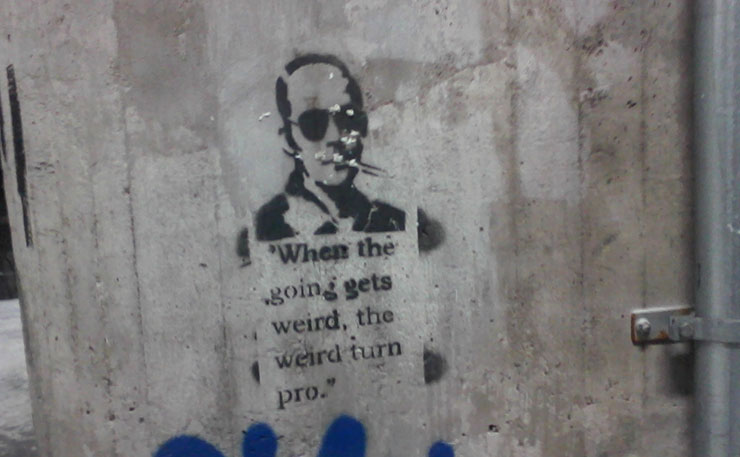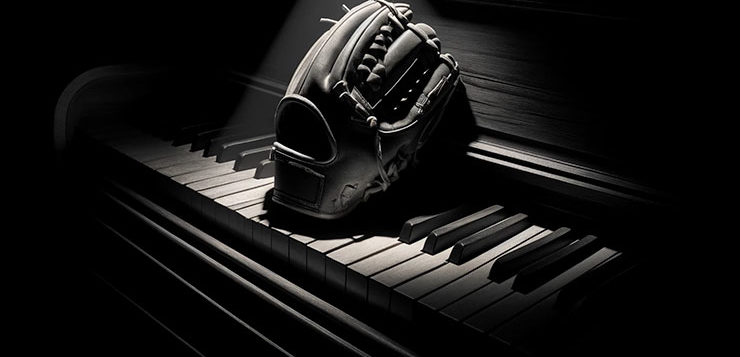Life’s lessons often come at you in ways you don’t expect, writes Glenn Scott. And when they do, you better have your mitts ready.
Mentors are important. Sometimes you find them, sometimes they find you. Chris Graham, the Grand Poopah here at New Matilda, found yours truly berating the coffee gods via the medium of Facebook. However, before finding my true calling as an NM columnist, I have previously “found” myself a great many things, including salesman, teacher, farm manager and wholesaler.
Also, for large parts of my life, musician, sound engineer, producer and studio owner. So yes, my résumé is a terrifying mess. Luckily, I’ve never had use for one, rather, I have regularly found myself the beneficiary of the knowledge, skills and benevolence of those I have met along the way….
I never dreamed of being a rockstar. I actually wanted to be Norman Mailer, or Hemingway, or Hunter S Thompson. However, as the music industry appeared a more practical solution to the question of “what do you want to do when you grow up?” (ridiculous as that may sound) I spent my teens immersed in both music and literature.
And my heroes in music where not the musicians. They were the engineers and producers behind the records. I spent countless hours in headphones dissecting the work of Trevor Horn, Robert “Mutt” Lange, Daniel Lanois, Quincy Jones. I read credits and liner notes. I subscribed to industry magazines like “Audio Technology” and “Keyboard Magazine”. And I grabbed every opportunity to get inside a recording studio that came along.
So, when presented with the opportunity to spend a week recording with Joe Camilleri (Jo Jo Zep/Black Sorrows) in his Woodstock Studios in Melbourne, it wasn’t Joe whom I was most excited to work with, but his engineer, Michael Letho. I had read articles about Michael. Interviews, gear reviews. I knew the artists he had worked with. I knew his records. Truthfully, I was a little star struck.
To that time, as a working musician I had recorded with a decent number of different engineers and producers, and was used to adapting to the varying approaches one encountered. What struck me immediately upon entering Michael’s studio (it’s always the recording engineer’s studio) was the relaxed atmosphere he cultivated.
Michael was warm and friendly, and seemed to be simply hanging out chatting and cracking jokes, though suddenly he was level checking, balancing headphones and asking if we’d like to play something to loosen up before Joe arrived.

I looked around and realised he had been discretely working the whole time. He had mic’d up, run cables, laid out headphones, all virtually without us noticing. And this casual, understated attitude set the tone for the entire week.
Now there are many world class engineers who have very fixed methods of getting their “sound”. Some require certain pieces of gear or microphones, some will have strict instructions for the musicians, some will have head movement restrictions for singers, some will want to replace musician’s instruments, some will want to replace musicians. Michael does none of that. He has a very simple philosophy in everything he does that has seen him work with some of the biggest names on the planet, and that philosophy is encapsulated in one of his favourite studio maxims.
“You throw, I’ll catch.”
If you work with Michael, you will hear him say this. You will hear him say it more than once. It’s his answer to a multitude of the questions that arise in the studio. And what he means is, ‘Don’t you worry about that. That’s my job. You simply do whatever it is you need to do to deliver the best performance you can and I will work with and around you, I will change and adapt to you.’
This is exceptionally liberating for a musician. And it is an exceptionally powerful posture for an engineer. It is the expression of the very essence of recording. To capture a performance.
I experienced the power of this philosophy, when, during that week in Woodstock, I suffered a moment of performance anxiety recording a piano part. Michael subtly engineered a performance from me that I would never have delivered otherwise (you can read that story here).
Since those days Michael and I have worked together many times and he has proved to be an immensely important mentor and great friend. These days, when we’re not discussing the philosophy of Peter Weir movies, the perfection of Steely Dan recordings or the insanity of Trevor Horn productions, you can often find us talking about the insights of recording and the studio as metaphor.
I have stated that I learned one of the most valuable lessons of my life back there in Woodstock Studios, and that is very true. And, upon reflection, that lesson has served me well not only in the studio but in every area of my life.
It is a lesson about taking on a certain attitude, a certain posture. An attitude of relaxed awareness and watchfulness, of adaptability and accountability, of responsibility and reliability. It is a posture of readiness, of invitation, an openness to whatever may eventuate. It is a demonstration of trust and self-belief, of trust in one’s knowledge and skills and belief in one’s natural creative ability to meet change.
It’s the willingness to look the future in the eye and say, “You throw, I’ll catch”.
Donate To New Matilda
New Matilda is a small, independent media outlet. We survive through reader contributions, and never losing a lawsuit. If you got something from this article, giving something back helps us to continue speaking truth to power. Every little bit counts.




